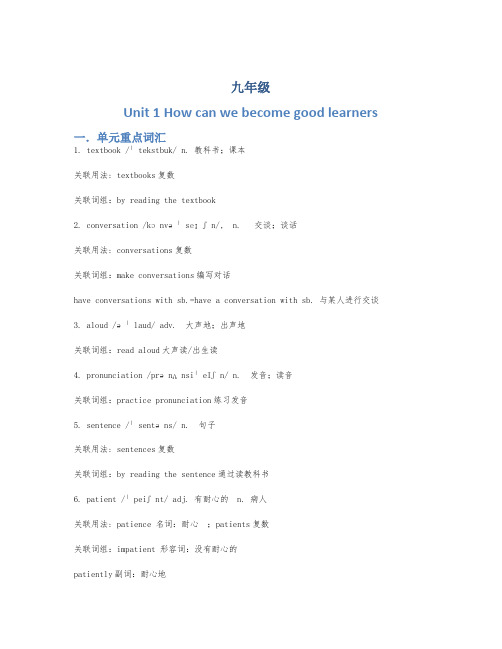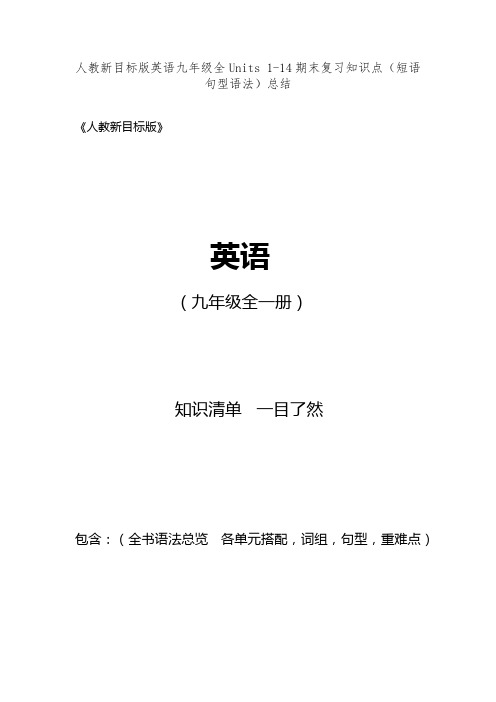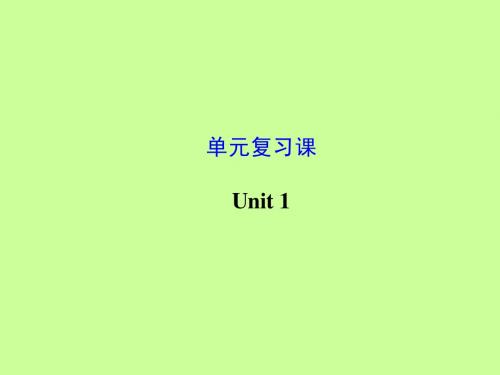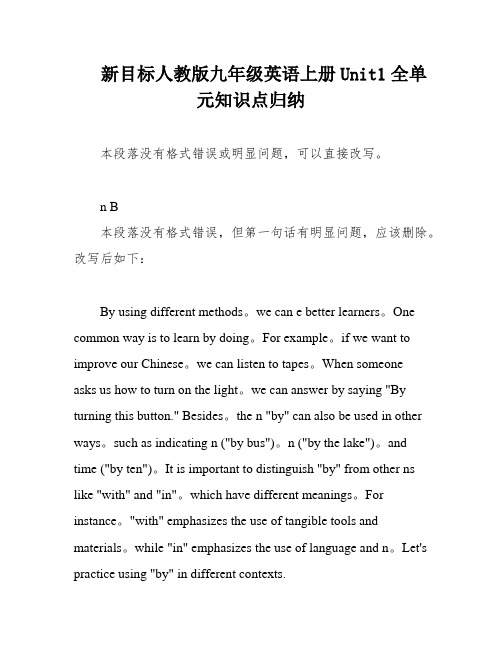人教版(新目标)初三复习九年级Unit1-Unit12知识汇总
人教版新目标初三英语九年级第一单元单词语法知识点总结

九年级Unit 1 How can we become good learners一.单元重点词汇1.textbook /ˈtekstbuk/ n. 教科书;课本关联用法: textbooks复数关联词组:by reading the textbook2.conversation /kɔnvəˈs eɪʃn/, n. 交谈;谈话关联用法: conversations复数关联词组:make conversations编写对话have conversations with sb.=have a conversation with sb. 与某人进行交谈3.aloud /əˈlaud/ adv. 大声地;出声地关联词组:read aloud大声读/出生读4.pronunciation /prənʌnsiˈeIʃn/ n. 发音;读音关联词组:practice pronunciation练习发音5.sentence /ˈsentəns/ n. 句子关联用法: sentences复数关联词组:by reading the sentence通过读教科书6.patient /ˈpeiʃnt/ adj. 有耐心的 n. 病人关联用法: patience 名词:耐心;patients复数关联词组:impatient 形容词:没有耐心的patiently副词:耐心地be patient with sb.对某人有耐心be patient of sth.对某事能容忍have (no) patience with…对…(没)有耐心lose patience with 对…失去耐心out of patience 没有耐心7.expression /ikˈspreʃn/ n. 表达(方式);表示关联用法:expressions复数关联词组:facial expressions 面部表情8.discover /dIˈskʌvə (r)/ v. 发现;发觉关联用法:discovery 名词:发现9.secret /ˈsi:krət/ n. 秘密;adj. 秘密的;保密的关联用法:secrets复数关联词组:in secret秘密地;keep a secret保密;a secret plan秘密的计划10.look up (在词典,参考书中或通过电脑)查阅;抬头看11.fall in love with 爱上;与⋯⋯相爱12.grammar /ˈgræmə (r)/ n. 语法关联词组:in grammar在语法方面13.repeat /riˈpi:t/ v. 重复;重做关联用法:secrets复数关联词组:repetition名词:重复14.note /nəut/ n. 笔记;记录 v.注意;指出关联用法:notes复数关联词组:please note 清注意;take notes记笔记15.pal /pæl/ n.朋友;伙伴关联词组:penpal笔友16.physics /ˈfiziks/ n. 物理;物理学关联单词:adj. 物理的;身体的;物质的;根据自然规律的,符合自然法则的关联词组:Space Physics 空间物理学物理空间空间物理17.chemistry /ˈkemistri/ n. 化学关联词组:Organic Chemistry 有机化学18.memorize /ˈmeməˌraɪz/ v 记住;记忆关联单词:memory n.记忆关联用法:过去式 memorized过去分词 memorized现在分词 memorizing第三人称单数memorizes典型例句:Have you memorized your lines for the play yet?你记住剧本中的台词了吗?19.pattern /ˈpætn/, /ˈpætən/ n.模式;方式20.pronounce /prəˈnaʊns/ v. 发音关联用法:过去式 pronounced过去分词 pronounced现在分词pronouncing第三人称单数 pronounces关联词组:Pronounce correctly 发音正确正确发音典型例句:I can not pronounce correctly 我不能正确发音21.increase /Inˈkri:s/ v. 增加;增长关联用法:过去式 increased过去分词 increased现在分词 increasing复数 increases第三人称单数 increasesn. 增加;增多;增长关联词组:increase by 增加了;按…增长on the increase 正在增加,正在增长22.speed /spi:d/ n.速度 v.加速关联单词:speeding超速关联用法:过去式 sped或speeded过去分词 sped或speeded现在分词 speeding关联词组:speed up 加速加快速度使加速加快speed limit 速度限制时速限制限速最高车速23.partner /ˈpa:(r)tnə (r)/ n. 搭档;同伴24.born /bɔːn/ v.出生 adj.天生的关联词组:be born with 天生具有born yesterday 乳臭未干典型例句:Swift was born in 1667.斯威夫特生于1667年。
人教新目标初中英语九年级单词一词一句(Units11-12)

初中英语九年级词汇表全面收录初中英语新教材的全部单词并按在教材单词表中出现的顺序编排,每个单词搭配一个例句,例句时尚鲜活,再现巩固单词,并配有延伸拓展栏目,总结搭配、用法、辨析易混词,提升单词运用能力。
Unit 111. rather [ˈrɑ:ðə] adv. 宁愿;相反would rather 宁愿I'd rather go to Blue Ocean because I like to listen to quiet music while I'm eating. (P81)我宁愿去蓝色海洋(餐馆)因为我喜欢在吃饭时听安静的音乐。
2. drive [draɪv] v. 迫使drive sb. crazy/ mad 使某人发疯/发狂Waiting for Any drove Tina crazy. (P82)等待埃米使蒂娜发疯。
3. the more …the more 越⋯⋯越⋯⋯;愈⋯⋯愈⋯⋯Well,the more I got to know Julie, the more I've realized that we have a lot in common. (P82) 嗯,我了解朱莉越多,我越意识到我们有更多的共同点。
4. lately [ˈleɪtlɪ] adv. 最近;不久前So we've been spending more time together lately. (P82)所以最近我们花更多的时间在一起。
5. be friends with sb. 成为某人的朋友It makes Alice unhappy because she thinks Julie is now better friends with me than with her.( P82) 那使艾丽斯不高兴因为她认为朱莉现在和我的朋友关系比和她好。
6. leave out 不包括;不提及;忽略Then she won't feel left out. (P82)那么她就不会感到自己被冷落了。
人教新目标版英语九年级全Units 1-14期末复习知识点(短语句型语法)总结

人教新目标版英语九年级全Units 1-14期末复习知识点(短语句型语法)总结《人教新目标版》英语(九年级全一册)知识清单一目了然包含:(全书语法总览各单元搭配,词组,句型,重难点)教你几个常用的英语期末考试技巧不管期末还是中考,很有用哦!1、当看到选项中有课本上本单元重点语法时,一般会选择该选项,比如说U1学的by ,那么看到期末考试开始的介词时优选选By(中考不一定)2、介词+doing 大家都知道,但是考试的时候出现了介词,你知道这个是介词吗?如果你知道,不管啥意思,后面选doing3、阅读中都会有潜规则的小顺序问题,对号入座即可,还有,很多选项确实不知道选择什么时,一定要记住——优先选择正能量,拒绝太绝对4、当看到生词时候,我们很多时候都是想去蒙一下,但是为什么不用排除法呢,那样正确率会很高,为啥会有生词——因为出题人想让你——懵!5、词语运用很多时候我们比较害怕那些首字母或者盲填项,但是你有没有发现这些空都是一个小规律——介、冠、连、代!正确率90%,不信你试试!6、我们写作文都想得高分,但是你知道看卷子的老师把大部分时间都放在哪里吗?——开头与结尾,你的开头很精彩吗?不会又是hello ,everyone ,my name is……吧?来几个漂亮的高级句型,多漂亮,多精彩!多学学吧!人教新目标九年级教科书细节知识点目录总览Unit 1 How can we become good learners?本单元主要语法点1.以 by为代表的介词用法2. 介词+V. ing和介词+宾格用法Unit 2 I think that mooncakes are delicious!本单元主要语法点1. that, if, whether及其他疑问词引导的简单宾语从句2. What 和How引导的感叹句Unit 3 Could you please tell me where the restrooms are?本单元主要语法点1. 情态动词用法汇总复习2.宾语从句的深入用法Unit 4 I used to be afraid of the dark.本单元主要语法点1. used to的用法2. 现在完成时,一般过去时复习Unit 5 What are the shirts made of?一般现在时的被动语态Unit 6 When was it invented?本单元主要语法点一般过去时的被动语态Unit 7 Teenagers should be allowed to choose their own clothes.本单元主要语法点含情态动词的被动语态的用法Unit 8 It must belong to Carla.本单元主要语法点must, might, could和can’t为代表的情态动词表推测Unit 9 I like music that I can dance to.本单元主要语法点定语从句的用法Unit 10 You’re supposed to shake hands.本单元主要语法点1. be supposed/expected to do2. It’s + adj. + for sb to do sth3. If 从句,被动语态,状语从句复习Unit 11 Sad movies make me cry.本单元主要语法点1. make sb do sth等接不带to的不定式作宾补的短语2. make sb + adj等结构用法3. 被动语态复习Unit 12 Life is full of the unexpected.本单元主要语法点1. 过去完成时(非中考考点)2. 一般过去时复习Unit 13 We’re trying to save the earth!本单元主要语法点1.情态动词2.used to 用法3. 现在进行时、现在完成时、被动语态等复习Unit 14 I remember meeting all of you in Grade 7.本单元主要语法点1.宾语从句2. 一般将来时3.动名词的用法Unit 1 How can we become good learners?【必背短语】1.finish doing sth 完成做某事2.fell in love with sb /sth 爱上某人/某事1. have conversation with sb. 同某人谈话2. too…to… 太……而不能3. the secret to… ……的秘诀4. be afraid of doing sth./ be afraid to do sth. 害怕做某事5. look up 查阅6. repeat out loud 大声跟读7. make mistakes in 在……方面犯错误8. connect ……with… 把……和……连接/联系起来9. get bored 感到厌烦10. be stressed out 焦虑不安的11. pay attention to 注意;关注12. depend on 取决于;依靠13. the ability to do sth.. 做某事的能力【细节知识点】1.Just read quickly to get the main ideas这句话中to get 是动词不定式做目的状语,这种用法大家一定要注意2.everyone is born with the ability to learnbe born with 出声这句话之中to learn 是动词不定式做定语,修饰前面的名词ability3.by + doing :通过……方式其实不光是by,而且很多介词后面都要用名词形式,大家一定要记住这个规则!4. talk about 谈论,议论,讨论talk to sb= talk with sb 与某人说话5. a lot 许多 ,常用于句末表示强调。
最新 人教版新目标英语九年级期末复习:Unit 1 单元复习ppt课件

→__________ (n. )表情; 表示; 表
→__________ (adv. )明智地; 聪
答案: 15. pronunciation
16. expression
17. wisely
Ⅱ. 短语互译 1. 制作单词卡 2. 大声朗读 3. 记笔记 4. 注意; 关注 5. 犯错; 出错 __________ word cards read________ __________ notes pay__________ to make________
答案: 1. ake
mistakes
2. aloud
3. take
4. attention
5.
6. 天生具有 7. be afraid to 8. depend on 9. connect. . . with 10. look up
______________ ______________ ______________ ______________ ______________ 8. 取决于; 依赖;
______________ ______________ ______________ ______________ ______________
12. 回顾; 复习(v. & n. )
13. 知识; 学问(n. ) 14. 终身的; 毕生的(adj. ) 答案: 7. increase 8. ability 11. active 12. review
programs.
答案: How; by watching
2. ——你通过听磁带来改善你的发音吗? —Do you improve your pronunciation__________ __________ to tapes? ——是的。它对我的发音有很大帮助。 —Yes, I do. It__________ my pronunciation a lot. 答案: by listening; helps
人教版新目标九年级Unit12单元复习

lose weight 减肥 find out 弄清;查明 cancel his show 取消他的节目 police officers 警官 rush to ... 匆忙去…… more than 超过;多于 run away from 逃离 on the first day of school在上学第一天 turn around 转向;回转 hand in 上交 be about to do sth. 正要做某事 end up doing sth. 以做某事告终
知识归纳
by the time ... 在……以前
go off
(闹钟)发出响 声
rush out of the door
冲出门外
give ... a lift
捎……一程
at least
至少
be five minutes late for class
上课迟到5分钟
be full of ...
充满……
t_h_o_u_g_h_t_ ___to____m_y_s_e_l_f __.
Ⅲ. 根据对话内容,从方框中选择恰当的选项补 全对话,其中有两项多余。
A. By taxi. B. Yes, she did. C. Why were you late? D. But today I came very close. E. Was your teacher angry with you? F. Well, you must have been in a hurry. G. But when I got there, the bus had just left.
9. Sorry, I'm late for the party. I o_v_e_r_s_l_ep__t . 10. He bought many things for travelling
新目标人教版九年级英语上册Unit1全单元知识点归纳

Unit 1 How can we become good learners?课文知识点解析“by+doing 形式”表示方式、方法拓展:介词by 的其他用法:1)by+交通工具,“乘/坐...” by bus2)by+地点,“在...的旁边;靠近...” by the lake3)by+时间,“截止到...;不迟于...” by ten4)辨析by 、with 、in ,“用”Eg. We ’ll be traveling by car.He broke the window with a stone.Please answer the question in English.即学即练:1.-How do you learn English words? -_____making word cards.A. ToB. ByC. ForD. With2.-How do you get to school every day. Lucy? -I go to school _____.A.ride my bikeB.by my bikeC.by busD.by a bus3.Mr.Scott made a living by____(sell) old things.4.She learns English by listening to tapes.(对划线部分提问)_____ ______ she learn English?5.Most of them take the train to work.(改为同义句)Most of them go to work ______ ______.要点详解:Section A1.by asking the teacher for help通过向老师求助。
(P1) 1)by,“通过;靠”,后加名词/代词/动名词。
Eg. He had to do all the work by hand.2)ask (sb) for sth,“向某人要某物;要求某人某事”。
Unit 12【单元知识点复习】九年级英语全一册单元复习(人教版)

单元复习12 Unit 12 Life is full of the unexpected
词汇
单词
1._b_a_c_k_p_ac_k_背包;旅行包 2._o_v_e_r_sl_e_e_p 睡过头 3.__m__is_s___错过;未得到 4._u_n_e_x_p_ec_t_ed 出乎意料的;始料不及的 5.__b_l_o_c_k__街区 6.__w_o_r_k_e_r_工作者;工人 7.__s_ta_r_e___ 盯着看;凝视8._d_is_b_e_l_ie_f_不信;怀疑 9.__a_b_o_v_e__在上面;向上面 10.___b_u_rn___着火;燃烧 11.__a_l_iv_e___ 活着;有生气的12.___t_i_ll___ 到;直到 13.__w__e_st___向西;朝西adj. 向西的;西部的n. 西;西方 14.__c_r_e_a_m__奶油;乳脂 15.___b_o_s_s__老板;领导 16.___p_ie____果馅饼;果馅派 17.__c_o_u_rs_e__课程 18.__b_e_a_n___豆;豆荚 19.__m_a_r_k_e_t _市场;集市
单词
Ⅱ. 用括号内所给动词的适当形式填空。 11. We had _p_a_in_t_e_d__(paint) the house before we m__o_v_e_d___(move) in. 12. Tom said heh_a_d__re_a_d__(read) the book twice. 13. Most of my good friends _h_a_d_l_e_ft__(leave) when I _a_rr_i_v_e_d__(arrive) at the party. 14. By the time I _w_a_lk_e_d___(walk) into the store,someone _h_a_d_b_o_u_g_h(bt uy) the jeans I wanted. 15. My mother h_a_d__c_o_m_e_(come) back from the market when I ___g_o_t___(get) up.
新目标人教版九年级英语上册Unit1全单元知识点归纳

新目标人教版九年级英语上册Unit1全单元知识点归纳本段落没有格式错误或明显问题,可以直接改写。
n B本段落没有格式错误,但第一句话有明显问题,应该删除。
改写后如下:By using different methods。
we can e better learners。
One common way is to learn by doing。
For example。
if we want to improve our Chinese。
we can listen to tapes。
When someoneasks us how to turn on the light。
we can answer by saying "By turning this button." Besides。
the n "by" can also be used in other ways。
such as indicating n ("by bus")。
n ("by the lake")。
and time ("by ten")。
It is important to distinguish "by" from other ns like "with" and "in"。
which have different meanings。
For instance。
"with" emphasizes the use of tangible tools and materials。
while "in" emphasizes the use of language and n。
Let's practice using "by" in different contexts.即学即练:1.-How do you learn English words。
- 1、下载文档前请自行甄别文档内容的完整性,平台不提供额外的编辑、内容补充、找答案等附加服务。
- 2、"仅部分预览"的文档,不可在线预览部分如存在完整性等问题,可反馈申请退款(可完整预览的文档不适用该条件!)。
- 3、如文档侵犯您的权益,请联系客服反馈,我们会尽快为您处理(人工客服工作时间:9:00-18:30)。
Www.chinaedu.com 1 人教版(新目标)初三复习九年级Unit1-Unit12知识汇总 Unit1 1. by + doing 通过……方式 如:by studying with a group by 还可以表示:“在…旁”、“靠近”、“在…期间”、“用、” “经过”、“乘车”等 如:I live by the river. I have to go back by ten o’clock. The thief entered the room by the window. The student went to park by bus. 2. talk about 谈论,议论,讨论 如:The students often talk about movie after class. 学生们常常在课后讨论电影。 talk to sb. === talk with sb. 与某人说话 3. 提建议的句子: ①What/ how about +doing sth.? 如:What/ How about going shopping? ②Why don’t you + do sth.? 如:Why don’t you go shopping? ③Why not + do sth. ? 如:Why not go shopping? ④Let’s + do sth. 如: Let’s go shopping ⑤Shall we/ I + do sth.? 如:Shall we/ I go shopping? 4. a lot 许多 常用于句末 如:I eat a lot. 我吃了许多。 5. too…to 太…而不能 常用的句型 too+adj./adv. + to do sth. 如:I’m too tired to say anything. 我太累了,什么都不想说。 6. aloud, loud与loudly的用法 三个词都与"大声"或"响亮"有关。 ①aloud是副词,重点在出声能让人听见,但声音不一定很大, 常用在读书或说话上。通常放在动词之后。aloud没有比较级 形式。如: He read the story aloud to his son. 他朗读那篇故事给他儿子听。 ②loud可作形容词或副词。用作副词时,常与speak, talk, laugh等动词连用,多用于比较级,须放在动词之后。如: She told us to speak a little louder. 她让我们说大声一点。 ③loudly是副词,与loud同义,有时两者可替换使用,但往往 含有令人讨厌或打扰别人的意思,可位于动词之前或之后。如: He does not talk loudly or laugh loudly in public. 他不当众大声谈笑。 7. not …at all 一点也不 根本不 如: I like milk very much. I don’t like coffee at all. 我非常喜欢牛奶。我一点也不喜欢咖啡。 not经常可以和助动词结合在一起,at all 则放在句尾 8. be / get excited about sth.=== be / get excited about doing sth. === be excited to do sth. 对…感兴奋 如: I am / get excited about going to Beijing.=== I am excited to go to Beijing. 我对去北京感到兴奋。 9. ① end up doing sth 终止做某事,结束做某事 如: The party ended up singing. 晚会以唱歌而结束。 ② end up with sth. 以…结束 如: The party ended up with her singing. 晚会以她的歌唱而告终。 10. first of all 首先 Www.chinaedu.com 2
. to begin with 一开始 later on 后来、随 11. also 也、而且(用于肯定句)常在句子的中间 either 也(用于否定句)常在句末 too 也 (用于肯定句) 常在句末 12. make mistakes 犯错 如:I often make mistakes. 我经常犯错。 make a mistake 犯一个错误 如: I have made a mistake. 我已经犯了一个错误。 13. laugh at sb. 笑话;取笑(某人) 如:Don’t laugh at me! 不要取笑我! 14. take notes 做笔记,做记录 15. enjoy doing sth . 喜欢做…乐意做… 如: She enjoys playing football. 她喜欢踢足球。 enjoy oneself 过得愉快 如:He enjoyed himself. 他过得愉快。 16. native speaker 说本族语的人 17. make up 组成、构成 18. one of +(the+ 形容词比较级)+名词复数形式 …其中之一 如: She is one of the most popular teachers. 她是最受欢迎的教师之一。 19. It’s +形容词+(for sb. ) to do sth. (对于某人来说)做某事… 如:It’s difficult (for me ) to study English. 对于我来说学习英语太难了。 句中的it 是形式主语,真正的主语是to study English 20. practice doing 练习做某事 如: She often practice speaking English. 她经常练习说英语。 21. decide to do sth. 决定做某事 如: LiLei has decided to go to BeiJing . 李雷已经决定去北京。 22. unless 假如不,除非 引导条件状语从句 如:You will fail unless you work hard..假如你不努力你会失败。 I won’t write unless he writes first. 除非他先写要不我不写 23. deal with 处理 如:I dealt with a lot of problem. 24. worry about sb./ sth. 担心某人/ 某事 如:Mother worried about his son just now. 妈妈刚才担心他的儿子。 25. be angry with sb. 对某人生气 如: I was angry with her. 我对她生气。 26. perhaps === maybe 也许 27. go by (时间) 过去 如: Two years went by. 两年过去了。 28. see sb. / sth. doing 看见某人正在做某事 强调正在发生 see sb. / sth. do 看见某人在做某事 如: 如: She saw him drawing a picture in the classroom. 她看见他正在教室里画画。 29. each other 彼此 30. regard… as … 把…看作为…. 如: The boys regarded Anna as a fool. 这些男孩把安娜看成傻瓜。 Www.chinaedu.com 3
31. too many 许多 修饰可数名词 如:too many girls too much 许多 修饰不可数名词 如:too much milk much too 太 修饰形容词 如:much too beautiful 32. change… into… 将…变为… 如:The magician changed the pen into a book. 这个魔术师将这本书变为一本书。 33. with the help of sb. == with one’s help 在某人的帮助下 如:with the help of LiLei == with LiLei’s help 在李雷的帮助下 34. compare … to … 把…与…相比 如:Compare you to Anna, you are lucky. 你和安娜相比,你是幸运的。 35. instead 代替 用在句末,副词(字面上常不译出来) instead of sth. / doing sth. 代替,而不是 用在句中,动词 如:Last summer I went to Beijing. This year I’m going to Shanghai instead.去年夏天我去北京, 今年我将要去上海。 I will go instead of you. 我将代替你去。 He stayed at home instead of going swimming. 他呆在家里而不是去游泳。
九年级英语Unit2 1. used to do sth. 过去常常做某事 否定形式: didn’t use to do sth. / used not to do sth. 如:He used to play football after school. 放学后他过去常常踢足球。 Did he use to play football? Yes, I did. No, I didn’t. He didn’t use to smoke. 他过去不吸烟。 2. 反意疑问句 ①肯定陈述句+否定提问 如:Lily is a student, isn’t she? Lily will go to China, won’t she? ②否定陈述句+肯定提问 如: She doesn’t come from China, does she? You haven’t finished homework, have you? ③提问部分用代词而不用名词 Lily is a student, isn’t she? ④陈述句中含有否定意义的词,如:little, few, never, nothing, hardly等。其反意疑问句用肯定式。 如: He knows little English, does he? 他一点也不懂英语,不是吗? They hardly understood it, did they?他们几乎不明白,不是吗? 3. play the piano 弹钢琴 4. ①be interested in sth. 对…感兴趣 ②be interested in doing sth. 对做…感兴趣 如:He is interested in math, but he isn’t interested in speaking English. 他对数学感兴趣,但是他对说英语不感兴趣。 5. interested adj. 感兴趣的,指人对某事物感兴趣,往往主语是人 interesting adj.有趣的,指某事物/某人具有趣味,主语往往是物 6. still 仍然,还
